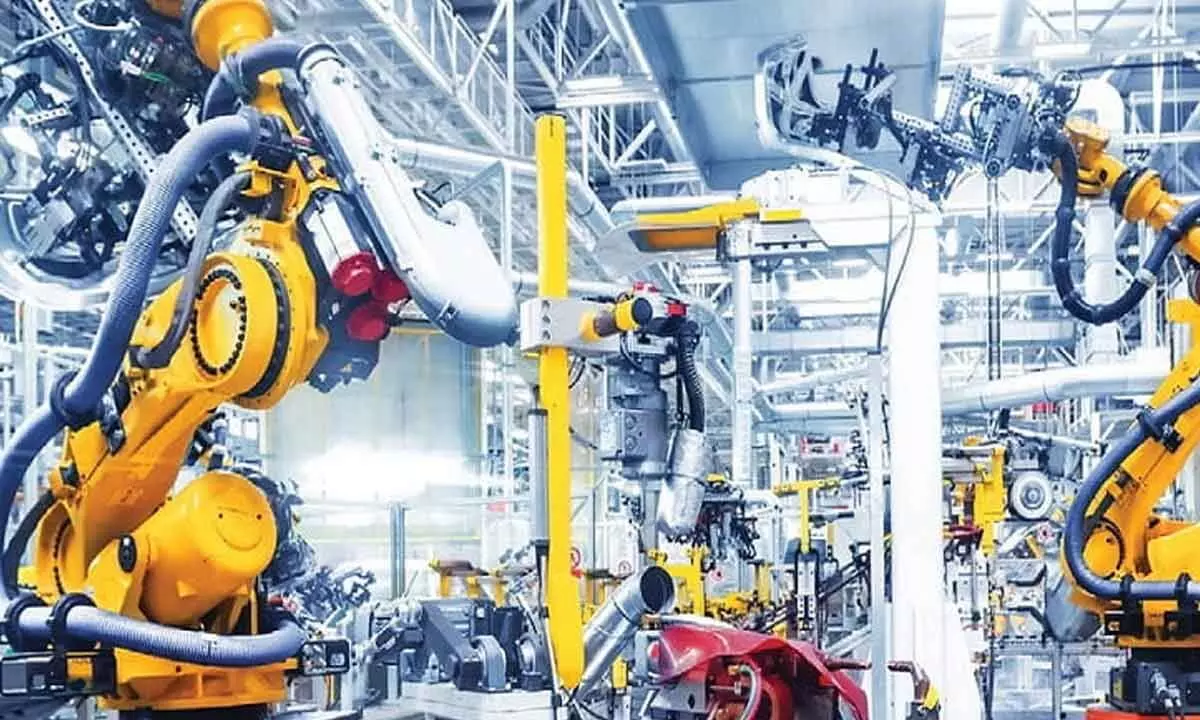Manufacturing can't be revived with control mindset
The Modi govt needs to expedite economic reforms and institutionalized control-friendly mindset has to undergoes a metamorphosis to revive manufacturing
image for illustrative purpose

Manufacturing remains India's Achilles' heel. In fact, it has been so for quite some time. Government after government has made serious efforts to do so. To little avail, if a recent report is to go by.
The profit-to-GDP ratio of listed manufacturing companies came down to 0.61 per cent in the second quarter of this fiscal, which is a nine-quarter low. This begs the question: whatever happened to all the programmes like Make in India and schemes like those production-linked incentives (PLI)?
Eleven years ago, National Manufacturing Policy 2011 said, "On an average, a manufacturing unit needs to comply with nearly 70 laws and regulations. Apart from facing multiple inspections, these units have to file sometime as many as 100 returns in a year. This kind of compliance burden puts-off young entrepreneurs and they are not willing to take up an entrepreneurial role. As a result, a large number of people who could have been self-employed and would contribute to further employment and enhance economic activity, end up accepting jobs much below their potential."
The issue of 'inspector raj' has been raised a million times; and all manner of ministers have made a million pledges to root it out. Yet, it is there.
This is not to say that the Narendra Modi regime has done nothing to improve the ease of doing business; efforts indeed have been made, and have been noticed by the World Bank and others.
To carry out reforms at the pan-India level, the Business Reforms Action Plan (BRAP) was introduced in 2014. "Based on the global best practice, assessment of reform implementation under BRAP is 100 per cent based on user feedback," said a recent report of the Department for Promotion of Industry and Internal Trade (DPIIT).
"As a landmark achievement 7,496 reforms were implemented across states and UTs as part of BRAP 2020 indicating commitment of states in implementing reforms to create conducive business environment. Various capacity-building programs are conducted for handholding states/UTs in this exercise of reform implementation. Best practices by states are also shared with all states/UTs encouraging replicability of reforms," the DPIIT report said.
These measures and the earlier ones, however, have failed to lift manufacturing, which has been shrinking since 2011-12. Its share in the country's gross value added (GVA) came down from 17.4 per cent in 2011-12 to 14.5 per cent in 2020-21.
GVA is obtained by adding the gross domestic product (GDP) to the subsidies on products and subtracting taxes on products from that sum. Manufacturing GVA grew by just 0.1 per cent in the first half of 2022-23. The disaggregated figure is more worrisome, showing a declining trend. After growing 4.8 per cent in Q1 of the current fiscal, it contracted 4.3 per cent in the second quarter.
One reason for the dip in the profits of manufacturing companies is obvious: the ongoing war in Ukraine, with the attendant problems like higher crude prices and disrupted supply chains. But, as we mentioned earlier, manufacturing has been ailing for years.
This is because we still have miles to go in terms of reforms. On the US-based Heritage Foundation's economic freedom index, India ranks very low, at 131, which places it in the "Mostly Unfree" category.
The BRAP boast notwithstanding, regulation is still a problem, with the grandees (who are often bureaucrats) manning the regulatory bodies. Anti-business attitudes in the system remain as strong as before, as evident from the perpetuation of the abomination called the National Anti-Profiteering Authority (NAA).
It was constituted to ensure that GST cuts got transmitted to the customer. Set up in 2017, it was given three years, but politicians and bureaucrats kept extending its term. Now it has been brought under the Competition Commission of India.
Manufacturing, which is a big employer, cannot be revived unless economic reforms are expedited and the institutionalized control-friendly mindset undergoes a metamorphosis. The Modi government must ensure that.

